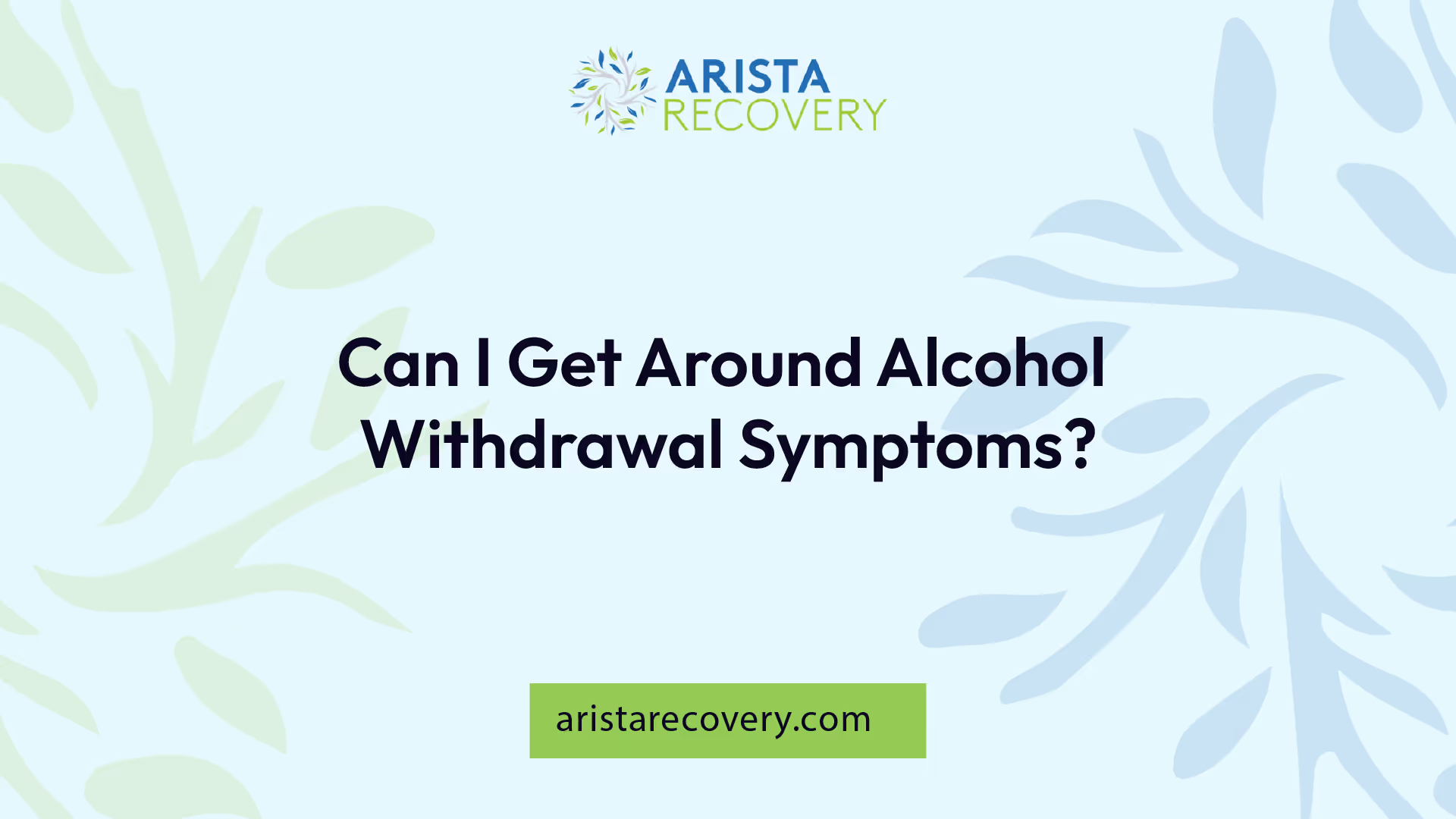Can I Get Around Alcohol Withdrawal Symptoms?


Understanding Alcohol Withdrawal
Understanding alcohol withdrawal is crucial for anyone seeking to overcome alcohol addiction. Symptoms can vary widely, presenting both mild discomfort and severe health risks.
Symptoms of Alcohol Withdrawal
The symptoms of acute alcohol withdrawal can range from mild to dangerous. Mild symptoms may start appearing as soon as eight hours after the last drink. More severe symptoms may become evident 24 hours after abstinence, while potentially life-threatening effects can develop 2 to 4 days later.
Mild SymptomsSevere SymptomsMild anxietyAlcohol withdrawal delirium (DTs)HeadacheTremorsGastrointestinal discomfortSeizuresInsomniaSevere confusion and agitation
Alcohol withdrawal syndrome typically begins with minor symptoms such as those listed above and can progress to more severe manifestations.
Severe Symptoms and Delirium Tremens
Delirium tremens (DTs) represents a severe form of alcohol withdrawal and can be life-threatening. The condition can lead to further complications such as tremors, seizures, and even death. The mortality rate for those experiencing DTs can range from 5% to 10%. Heavy drinkers, or long-term alcohol users, are particularly at risk and should not attempt to quit abruptly without medical supervision to avoid the onset of DTs.
Additionally, patients with alcohol withdrawal syndrome are at risk of hypophosphatemia, which can lead to refeeding syndrome. Checking and replenishing electrolytes, including magnesium and phosphorus, is crucial during treatment. Understanding these symptoms is vital for those asking, "can I get around alcohol withdrawal symptoms?" Being informed can help guide their recovery journey effectively.
Timeline of Alcohol Withdrawal
Understanding the timeline of alcohol withdrawal is crucial for those seeking to manage or minimize symptoms effectively. The symptoms can vary in onset and duration based on individual circumstances.
Onset and Duration
Alcohol withdrawal symptoms typically begin within a specific timeframe after the last drink.
Symptoms OnsetTime Frame After Last DrinkMild Symptoms6 to 8 hoursSerious Symptoms12 to 48 hoursDelirium Tremens48 to 72 hours
Mild symptoms such as anxiety, nausea, or shaking can start as early as 6 hours after the last alcohol intake. More serious issues, including hallucinations, can arise between 12 and 48 hours. Delirium tremens (DTs), which is a potentially life-threatening condition, typically occurs 48 to 72 hours after quitting alcohol [4].
Peak Symptoms and Recovery Time
The peak of alcohol withdrawal symptoms generally occurs around the third day following cessation. Most individuals can expect to experience withdrawal symptoms for several days.
Symptoms DurationTime Frame After Last DrinkSymptoms Peak24 to 72 hoursSymptoms Duration4 to 5 days
For most people, withdrawal symptoms will subside significantly within four to five days after the last drink. However, the duration can vary based on factors like the amount and duration of alcohol consumption. Some individuals may continue to experience symptoms for weeks or even months.
It’s essential for individuals facing alcohol withdrawal to be mindful of these timelines. Recognizing when to seek help from medical professionals can be particularly important, especially if severe symptoms arise.
Natural Approaches to Alcohol Withdrawal
When individuals seek to navigate alcohol withdrawal, exploring natural approaches can be a beneficial option. These methods may help ease symptoms and reduce cravings, supporting overall recovery.
Herbal Supplements and Lifestyle Changes
Herbal supplements have been recognized for their potential in alleviating alcohol withdrawal symptoms and enhancing liver health. Specific supplements like kudzu, ashwagandha, milk thistle, and St. John's wort are particularly noted for their effectiveness [5].
Herbal SupplementBenefitsKudzuEases withdrawal symptoms, reduces cravingsAshwagandhaMay alleviate stress and anxiety levelsMilk ThistleSupports liver healing and detoxificationSt. John's WortCan improve mood and reduce anxiety
In addition to herbal aids, lifestyle changes are essential. Replacing unhealthy habits with healthier routines, such as better nutrition, regular exercise, and engaging in relaxing hobbies, can significantly aid in easing alcohol withdrawal symptoms and reduce cravings.
Mindfulness Therapies and Meditation
Mindfulness therapies, particularly those involving meditation, have been shown to enhance awareness of thoughts, feelings, and cravings. This self-awareness can prevent relapse and encourage better management of withdrawal symptoms. Meditation promotes calmness and focus, which is vital during the withdrawal process.
Yoga, another mindfulness practice, is effective in reducing alcohol urges and supports individuals in handling withdrawal. It also reinforces the positive outcomes of meditation [6].
Incorporating these natural approaches into a recovery plan can help individuals manage withdrawal symptoms more effectively.
Holistic Practices for Alcohol Withdrawal
Holistic practices can provide effective support during the process of alcohol withdrawal. Techniques such as yoga and acupuncture, alongside deep breathing practices and proper hydration, have shown promise in helping individuals manage their symptoms and cravings.
Yoga and Acupuncture
Yoga has been proven to reduce urges to drink alcohol, which can be beneficial when navigating the withdrawal process. The physical and mental benefits of yoga also support the positive effects of meditation, creating a well-rounded approach to recovery.
Acupuncture, rooted in traditional Chinese medicine, is utilized to alleviate alcohol cravings and ease withdrawal symptoms. Research has indicated its effectiveness in helping individuals manage alcohol-related behaviors and navigate the emotional aspects of withdrawal.
Practice TypeBenefitsYogaReduces urges to drink, enhances meditation effectAcupunctureAlleviates cravings, eases withdrawal symptoms
Deep Breathing Techniques and Dehydration Management
Deep breathing techniques, often referred to as rhythmic breathing, are beneficial for lowering stress levels and clearing the mind. These calming practices can significantly improve an individual's capacity to handle the challenges of alcohol withdrawal [6].
Chronic heavy drinking often leads to dehydration, a condition that can worsen withdrawal symptoms. Increasing fluid intake, primarily through water consumption, aids in mitigating dehydration effects during this critical time.
Technique TypeBenefitsDeep BreathingLowers stress, clears mindHydrationHelps ease dehydration, supports recovery
Incorporating these holistic practices can play a valuable role in addressing the question of "can I get around alcohol withdrawal symptoms" by providing natural means to ease discomfort and promote overall well-being during recovery.
Medical Interventions for Alcohol Withdrawal
Effective management of alcohol withdrawal symptoms is essential to ensure safety and comfort during the recovery process. Medications are often a critical part of this management.
Medications for Symptom Relief
In cases where individuals are at risk for severe alcohol withdrawal, doctors may prescribe medications to alleviate discomfort and minimize the progression of symptoms. This approach can help reduce the likelihood of complications related to withdrawal [7]. The following medications are commonly utilized:
Medication TypeExamplesPurposeBenzodiazepinesChlordiazepoxide, Diazepam, Lorazepam, OxazepamFirst-choice medications that imitate alcohol effects in the brain to prevent withdrawal symptoms.BarbituratesPhenobarbitalUsed in severe cases to manage agitation or delirium tremens, often in combination with benzodiazepines.PropofolTypically used for anesthesiaAdministered in severe withdrawal cases to assist in sedation and comfort.Supportive medicationsIV fluids, electrolyte replacements (potassium, magnesium), vitamin supplements (thiamine, folate)Essential for hydration, restoring nutrients, and aiding recovery.
Benzodiazepines, particularly long-acting versions, are preferred due to their extended effects and lower risk of symptoms returning. Managing withdrawal with these medications typically resolves within seven days if alcohol is avoided consistently [8].
Risks and Complications
Failing to adequately manage alcohol withdrawal can lead to serious complications. The risk of neurotoxicity increases with inadequate treatment, which can elevate the chances of seizures after repeated withdrawal episodes—a phenomenon known as "kindling". Severe withdrawal symptoms may also lead to delirium tremens, a life-threatening condition characterized by severe confusion, tremors, and hallucinations.
Supportive care during treatment is pivotal. This care may involve intravenous fluids to combat dehydration, glucose for malnourished patients, and electrolyte replacements. In addition, vitamin supplementation is important to support recovery. Effective management of withdrawal symptoms not only alleviates discomfort but also minimizes the potential for long-term complications.
Critical Care for Severe Alcohol Withdrawal
In cases of severe alcohol withdrawal, the individual may require critical care to manage heightened symptoms and prevent potential complications. Hospital treatment becomes crucial when the symptoms escalate beyond home management.
Hospital Treatment
Severe or complicated alcohol withdrawal may necessitate treatment in a hospital setting. The main focus of management is to alleviate severe symptoms, which often involves administering long-acting benzodiazepines. Drugs like intravenous (IV) diazepam or IV lorazepam are commonly used to provide quick relief.
In some instances, additional medications may be necessary to address extreme symptoms like agitation or delirium tremens. A combination of specific medications may enhance treatment efficacy, especially in critical conditions.
Type of MedicationExamplePurposeLong-Acting BenzodiazepinesIV Diazepam, IV LorazepamManage severe alcohol withdrawal symptomsBarbituratesPhenobarbitalAssist with severe agitation and deliriumAnesthesia DrugsPropofolProvide sedation during severe withdrawal
Benzodiazepines and Supportive Care
Benzodiazepines are the cornerstone of treatment for severe alcohol withdrawal symptoms. They work by calming the nervous system, which can help prevent serious complications like seizures and hallucinations. This treatment is often combined with supportive care measures to ensure patient safety and comfort.
For patients experiencing delirium tremens, additional medications, such as Chlordiazepoxide and Diazepam, can be introduced to maximize therapeutic effects. Delirium tremens is a severe form of alcohol withdrawal that carries significant risks, with a mortality rate of about 5% to 10% if not effectively treated [2].
Supportive care factors are essential and may include:
Effective intervention and a well-structured treatment plan are vital for individuals facing severe alcohol withdrawal, especially during episodes of delirium tremens, which can be life-threatening.
References
[2]:
[3]:
[4]:
[5]:
[6]:
[7]:
[8]:
You’re not alone in this.
When mental health challenges and addiction intersect, it can feel isolating. At Arista, we offer compassionate, evidence-based, and trauma-informed care to help you heal, grow, and move forward.
You’re not alone in this.
When mental health challenges and addiction intersect, it can feel isolating. At Arista, we offer compassionate, evidence-based, and trauma-informed care to help you heal, grow, and move forward.
Support that moves with you.
You’ve taken a brave first step. At Arista Recovery, we’re here to help you continue with best-in-class care designed for long-term healing and support.
.webp)






